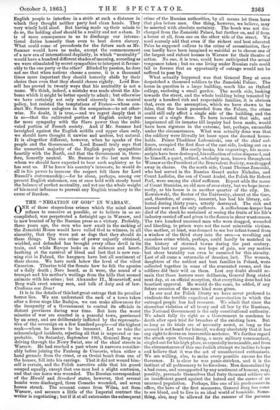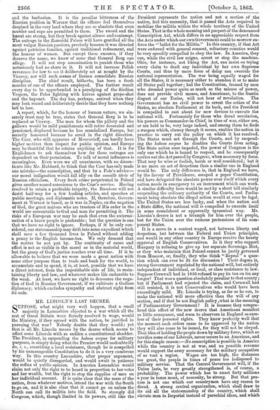THE "NEGATION OF GOD" IN WARSAW.
ONE of those stupendous crimes which the mind almost refuses to conceive as possible, or to believe in as ac- oomplished, was perpetrated a fortnight ago in Warsaw, and Is now boasted of by the Russian press as a victory. Probably, three years ago, the men who now exult in the sacking of the Zamoiski House would have called God to witness, in all sincerity, that they were not as dogs that they should do these things. The one crime of power unjustly obtained, wielded, and defended has brought every other devil in its train, and while Europe looks on in sickness and heart- loathing at the carnival of blood and lust that is now run- - ning riot in Poland, the hangmen have lost all sentiment of their shame. We have sunk below the level of the vilest Ceesarism. Tiberius told the Senate how he felt the agonies of a daily death ; Nero heard, as it were' the sound of a trumpet and his mother's wailings from the hills that seemed animate with his crime ; but Alexander II., Mouravieff, and Berg walk erect among men, and talk of duty and of law. Credimus esse Deos?
It is in the details of this last great outrage that its peculiar horror lies. We can understand the sack of a town taken ' after a fierce siege like Badajos, we can make allowances for the incapacity of a Government to control its officials in distant provinces during war time. But here the worst miseries of war are enacted in a peaceful town, garrisoned by an army, and are deliberately inflicted by the representa- tive of the sovereign on a few hundred people—of the highest rank—whom he knows to be innocent. Let us take the acknowledged incidents, rejecting all that is unproved or im- probable. On Saturday, September 19th, General Berg was driving through the Nowy Swiat, one of the chief streets in Warsaw. He had reached a part where it narrows consider- ably before joining the Faubong de Craeovie, when either a hand grenade from the street, or an Orsini bomb from one of the houses, fell into his carriage. That it did not wound him- self is certain, and the Polish narrative adds that his guard escaped equally, except that one man had a slight contusion, and that one horse was wounded. The Russian correspondent -of the Herald and Standard states, however, that several bombs were discharged, three Cossacks wounded, and seven horses struck. The account comes from Wilna, not from Warsaw, and savours a little of the Imperial contract the writer is negotiating; but if it at all extenuates the subsequent crime of the Russian authorities, by all means let them have that plea before men. One thing, however, we believe, may be asserted with absolute certainty. The bomb was not dis- charged from the Zamoiski Palace, but further on, and if from a house at all, from one on the other side of the street. We need scarcely add that even if the richest and best educated Poles be supposed callous to the crime of assassination, they can hardly have been imagined so suicidal as to choose one of the largest and richest houses in Warsaw for their theatre of action. No one, it is true, could have anticipated the actual vengeance taken ; but no one living under Russian rule could fail to foresee that an opportunity of outrage would not be suffered to pass by.
What actually happened was that General Berg at once despatched a thousand soldiers to the Zamoiski Palace. The house in question is a large building, much like an Oxford college, enclosing a small garden. The south side, looking towards the street, and the whole building being tenanted by nearly a hundred rich and respectable families, it is obvious that, even on the assumption, which we have shown to be false, that the bomb proceeded from the Palace, the crime could still only affect a single side of the building, and the rooms of a single floor. To have invested that side, and imprisoned all its inmates till inquiry had been made, would have been rigorous in the extreme, but, perhaps, excusable under the circumstances. What was actually done was that the soldiery were literally let loose upon the doomed house- holds. Prince Thaddeus Lubomirski, one of the chief suf- ferers, occupied the first floor of the east side, looking out on a different street. His costly books, his engravings, his manu- scripts have been destroyed, his collection of coins dispersed, and he himself, a quiet, refined, scholarly man, known throughout Warsaw as thePresident of the Benevolent Society, was dragged away in chains. On the north side, Count Thomas Zamoiski, who had served in the Russian Guard under Nicholas, and Count Ladislas, the son of Count Andre, the Polish Sir Robert Peel, were among the chief sufferers. Report adds the name of Count Stanislas, an old man of over sixty, but we hope incor- rectly, as his house is in another quarter of the city. Dr. Kowalewski, the Rector of the University, absent at the time, and, therefore, of course, innocent, has had his library, col- lected during thirty years, utterly destroyed. The rich and learned were not the only sufferers. A coffeehouse-keeper has died of the shock he sustained at seeing the fruits of his life's industry carried off and given to the flames in sheer wantonness. The two hundred unarmed men who were dragged, wounded and bleeding, to prison were not the most miserable victims. One mother, at least, was doomed to see her infant tossed from a window of the third story into the area—a revolting and causeless crime which, perhaps, could hardly be matched in the history of stormed towns during the past century. Neither lust nor passion, nor hope of gain, nor any motive but sheer brutality can even be surmised for this atrocity. Last of all came a saturnalia of drunken lust. The women, daughters of the noblest and best families in Poland, were collected together in some of the evacuated rooms, and the soldiers did their will on them. Lest any doubt should re- main that these horrors were deliberate, General Berg stated next day, at an official reception, that everything done had his heartiest approval. He would do the same, he added, if any future occasion of the same kind were given.
In our zeal for Polish liberty we have never professed to vindicate the terrible expedient of assassination to which the outraged people has had recourse. We admit that since the shameless violation of all treaty and all law by the Russians, the National Government is the only constitutional authority. We admit fully its right as a Government to condemn to death after open trial for breaches of the existing laws. Bat so long as its trials are of necessity secret, so long as the accused is not heard for himself, we deny absolutely that it has any right to decree an irreversible sentence. We further regard the attack upon General Berg, a mere military commandant, singled out for his high place, as especiallyinexcusable, and from the circumstances of this one foolish attempt we incline to hope and believe that it was the act of unauthorized enthusiasts. We are willing, also, to make every possible excuse for the Governor. It is clear he was panic-stricken, and it is the instinct of all poltroonery to be ferocious. Men demoralized by a bad cause, and unsupported by any sentiment of honour, may, possibly, persuade themselves that forty thousand soldiers arc an insufficient guard against the hatred and the curses of an unarmed population. Perhaps, like one of his predecessors in office, the hero of the first massacres, General Berg has come to see blood, and to live in an ideal world of homicide. Some- thing, also, may be allowed for the rancour of the parvenu and the barbarian. It is the peculiar bitterness of the Russian position in Warsaw that its officers feel themselves despised in the very land where they are so absolute that even murder and rape are permitted to them. The sword and the knout are strong, but they break against silence and contempt. The outrage in the Zamoiski Palace will have gratified all the most vulgar Russian passions, precisely because it was directed against patrician families, against traditional refinement, and the honour of women. But except these excuses, if they deserve the name, we know of none that General Berg can allege. It will not step assassination to punish those who notoriously had no share in it. It will not increase Polish reverence for law to see it deliberately set at nought by the Viceroy, nor will such scenes of licence consolidate Russian discipline. The chief result, hitherto, has been a fresh murder of one of the officers employed. The further result every day to be apprehended is a parodying of the Sicilian Vespers, the Poles fighting with knives against grape-shot and the bayonet. The day has, perhaps arrived when they may look round and deliberately decide that they have nothing left to lose.
A report, which, for the honour of human nature, we sin- cerely trust may be true, states that General Berg is to be replaced as Viceroy. The man for whom the pillory and the gallows would be mild punishments will retire decorated and pensioned, displaced because he has scandalized Europe, but secretly honoured because he erred in the right direction. The Czar, who still approves of Mouravieff, can hardly have higher motives than respect for public opinion, and Europe may be thankful that he retains anything of that. It is for Englishmen to ask themselves how far these outrages are dependent on their permission. To talk of moral influences is meaningless. Even were we all unanimous, with no dissen- tients like Mr. Hubbard, to think that the Czar has only made one mistake—the conscription, and that by a Pole's advice— our moral indignation would fall idly on the canaille lath of Russian officialism. Every fresh crime perpetrated in Poland gives another seared conscience to the Czar's service. Having resolved to retain a profitable iniquity, the Russians will not desist half-way for a few leading articles, and speeches at public meetings, and diplomatic notes. If, therefore, Govern- ment at Warsaw is based, as it was in Naples, on the negation of God, the great nations who are trustees of His order in the world are accountable to God and man for permitting it. The risks of a European war may be such that even the extermi- nation of a brave people is preferable • but the question is one that we have no right to ignore. Perhaps, if it be only con- sidered, our statesmanship may drift into some expedient which shall save a few thousand lives in Poland without adding a penny to the English income-tax. We only demand that the matter be not put by. The continuity of cause and effect is not as visible in the moral as in the material world, but the grasp of God's justice reaches over all time. If it be allowable to believe that we were made a great nation with some other purpose than to trade and bank for the world, to accumulate and to spend, it is, at least, possible that we have a direct interest, from the imperishable side of life, in main- taining liberty and law, and whatever makes life endurable to the weak. At least, we have no right to denounce the nega- tion of God in Russian Government, if we cultivate a Godless diplomacy, which excludes sympathy and abstract right from its code.































 Previous page
Previous page